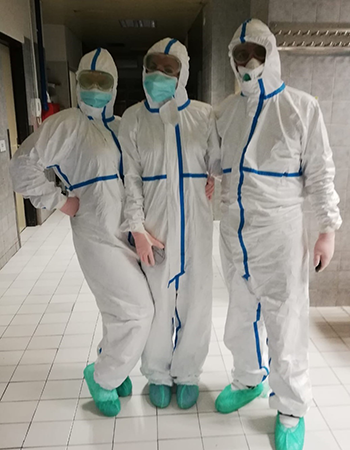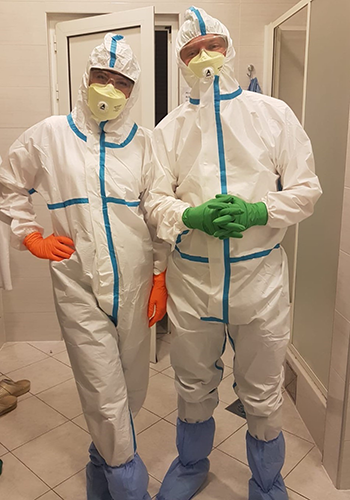The World Health Organization (WHO) declared the COVID-19 pandemic as a worldwide public health emergency on January 30, 2020. It rapidly disseminated throughout Europe from late February 2020 on, reaching Croatian borders in the beginning of March 2020. Accordingly, to handle this pandemic better, health systems worldwide, including in Croatia, were forced to be adjust. All national surgical facilities, including neurosurgery, have been swiftly restructured to evade possible risks of health system failure, as well as to provide an adequate service, particularly in an emergency. Hence, it is to say that the COVID-19 outbreak has dramatically changed the practice of an emergency neurosurgery in Croatia, where neurosurgical care to urgent elective and emergent patients has been appropriately provided taking into consideration preserving caregivers’ health as well.
At the department of neurosurgery of Sisters of Mercy University Hospital Center in Zagreb, Croatia, the emergency surgery capability and capacity were adequately enforced, insisting on proper mobilization and protection of the surgical workforce, to try and minimize the risk of disease transmission among patients and medical personnel. Therefore, every effort to preserve separate COVID-19-free pathways for emergency and elective neurosurgical patients has been taken with the aim of providing them secure and optimal care. Simultaneously, the halting of elective neurosurgical cases has been only temporary, having no major impact on standard neurosurgical care, while restarting of the regular operative program has been attuned to the current epidemiological situation. During the entire period, elective oncological and vascular patients were operated on continuously in separate operative theaters, although in lesser numbers, due to the reduced diagnostic capabilities in accordance with national public-health recommendations. However, surgery of spinal degenerative disease patients was mainly postponed for a few months if not being urgent elective, what matched the epidemiologists’ instructions to patients whose health condition was stable enough to stay at home.

During a five-month period (from March 22, 2020 until August 21, 2020) 16 urgent elective and/or emergency neurosurgical patients were operated on according to a specifically designed operative protocol where everyone coming from an outward hospital/institution without having a nasopharyngeal swab (NS) test was considered COVID-19 positive. A series consisted of 12 male and four female patients, mean-aged 65.8 years. The oldest one was an 88-year-old male, while the youngest was a 29-year-old man. All of them were tested for COVID-19 and none were positive. Nonetheless, they were all surgically treated according to the COVID-19 operative neurosurgical protocol due to an emergency, prior to receiving the NS test results. An intracranial hemorrhage of various causes was mainly observed, including traumatic acute epidural, and subdural hematoma, spontaneous intracerebral hematoma, as well as chronic subdural hematoma/hygroma. All patients underwent a decompressive unilateral craniectomy, except three patients with chronic subdural hematoma/hygroma where cranial trepanation was carried on, and two patients with spontaneous intracerebral hematoma where external venrticulostomy was only performed. Postoperatively, all were housed at Intensive Care Unit (ICU) and mechanically ventilated for a short period. Afterwards, all were accommodated in appropriate separate wards to minimize cross infection, and the great majority of them recovered well.
Although fever, and pulmonary complications were the most commonly observed in COVID-19 positive patients undergoing neurosurgery, no immediate postoperative complications related to the surgical procedure was recorded in our series.
Following national public-health recommendations, and according to specifically designed operative protocol for COVID positive and COVID suspected urgent elective and emergency neurosurgical patients, a separate operative theatre has been created for the management of high-risk/high-complexity patients who may have been exposed to COVID-19.? Careful clinical prioritizing was assured to select the patients for surgery, and to maintain social distancing, enabling medical staff to remain safe and risk free. The methods to decrease the risk of the infection transmission included regular supply/utilization of personal protective equipment (PPE), (Fig. 1 and 2) and consistent NS testing of all neurosurgical patients, as well as medical stuff involved. Therefore, the staff was provided with PPE in the operating theater, and the NS testing of asymptomatic patients scheduled for surgery was complied. However, NS testing was performed on symptomatic neurosurgical stuff only.
Executing such a protocol, we have managed to contain the spread of the disease throughout the hospital system, protecting our patients and stuff from cross infection, since none of our stationary patients, as well as none of the personnel have contracted the COVID-19 so far.
A small but sufficient group of clinicians and neurosurgeons responsible for decision-making was convened to supervise newly created service delivery methods, to diminish the risk of disease transmission, as well as to consider whether elective surgery patients would need access to ICU and to ensure a sufficient amount of free ventilators for COVID-19 positive neurosurgical patients. This was proved essential for the implementation of a comprehensive and effective approach to urgent elective and emergency neurosurgery management of COVID-19 positive and/or suspected neurosurgical patients.
Since our Center is a teaching hospital, the impact of COVID-19 pandemic upon education of medical students has been substantial, because all educational facilities were closed and the entire learnings and training were provided online, including exams.
Considering our experience, it seems that the impact of COVID-19 pandemic on neurosurgical care, as well as on educational process has been enormous, affecting many aspects of standard practices. However, the all- encompassing neurosurgical service for each and every patient has been preserved.
Further assessment of COVID-19 operative neurosurgical protocol is needed to upgrade the existing international and national public-health recommendations.









